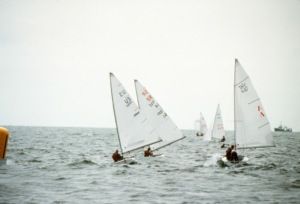News
Establishing Denmark as a major player in the sports equipment market
This article is more than 8 years old.
With strong credentials in sailing, cycling and even parkour, the sector is also being helped by Copenhagen’s continued drive to host major sports events such as Euro 2020 and the 2021 ICF Canoe Sprint World Championships

New improved parts from equipment companies can be the difference between gold and last (photo: Ken Hackman, US Air Force)
Idrættens Innovation Lab, a collaboration between Industriens Fond (IF) and the Danish Sports Association (DIF), will boost co-operation between sport and business – most particularly to the benefit of equipment manufacturers.
In 2015, the global turnover of the sports equipment sector was worth around 430 billion kroner according to Persistence Market Research, which predicts it will rise to 532 billion by 2020.
And since April 1, Danish companies have been able to apply for funding from the lab, thanks to an injection of 4 million kroner from IF.
Huge potential
Mads Lebech, the managing director of Industriens Fond, tells DI Business that there is huge potential for Danish companies to take a bigger slice of the market.
“If you develop a bike for elite competitors, it can also be sold to amateur cyclists. Or if you develop a mobile toilet system for a major sporting event, it can also be used in emergency shelters, for example,” he said.
Cycling, sailing, parkour
As well as cycling, sailing is another sport in which Denmark has a healthy balance of equipment companies and elite sportspeople. The radar company Weibel Scientific, for example, assisted Jonas Høgh-Christensen with new parts for his boat at the 2016 Olympics.
“There are some very good synergies in such a collaboration. We learn a lot about how to work with new materials that we can use in our development and production,” explained its chief financial officer Thomas Munkholm Larsen.
“Our involvement was not for profit. But you need to engage in such projects if we in Denmark are to become a centre for the development of new sports technology. So in the long run, it can prove to be profitable.”
Virklund Sport, meanwhile, specialises in multi-use school sports halls that can be used for traditional indoor games such as badminton and easily adapted for the use of new pastimes such as parkour.
Excelling as a host nation
In related news, particularly given the extra benefits that being a host nation of a major sports event will bring, Copenhagen has been ranked among the top ten by the Global Sports Cities Index. It finished eighth out of the 621 cities analysed.
The index assesses a 12-year period, in this case 2011-2023, ranking each sports event that the Danish capital has hosted, or submitted a bid to organise, a score depending on its size and prestige.
As well as Euro 2020, which will involve Copenhagen hosting four games, the capital staged the 2015 World Archery Championships and 2017 SUP Worlds, and it will later this year welcome the participants of the 2017 European Swimming Championships to the Royal Arena from December 13-17.
Among the other events recently confirmed are the 2021 ICF Canoe Sprint World Championships, which will take place just north of Copenhagen at Lake Bagsværd, 2018 IIHF Ice Hockey World Championship and the 2019 World Men’s Handball Championship.
More beds, more congresses
To help cope with the extra demand for hotel rooms, it has been confirmed that Greater Copenhagen will raise its hotel capacity from 46,673 to 51,983 rooms by 2021.
And it isn’t just a question of accommodating sports fans, as congresses and conferences also draw in many visitors. Among those recently announced is the 33rd Annual European Association of Urology Congress from March 16-20 next year, which will welcome more than 15,000 delegates from over 100 countries.










































